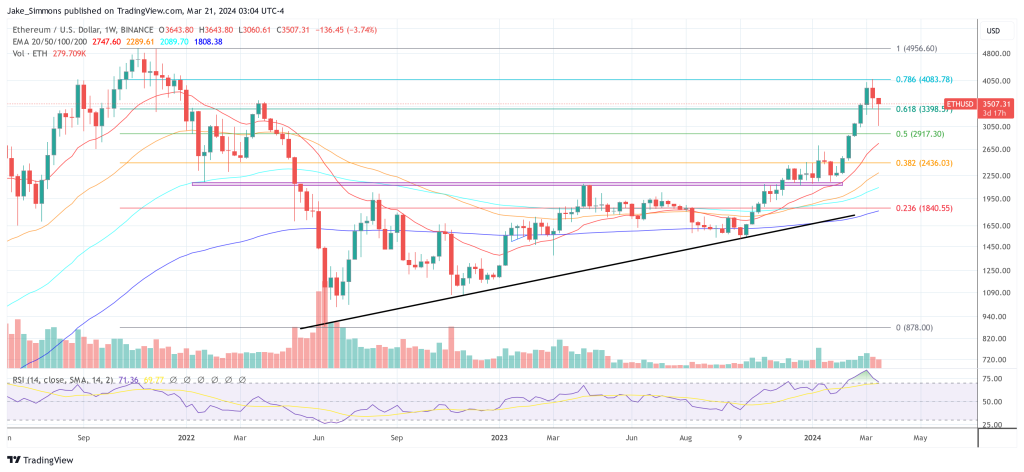The crypto industry finds itself at a pivotal juncture as the Swiss Ethereum Foundation received a “voluntary enquiry” from an undisclosed “state authority” which demanded confidentiality, as Bitcoinist reported yesterday. This revelation, made through the removal of the Warrant Canary from its website and a note in a Github repository, marks a first in the foundation’s history.
A little later, a report by Forbes surfaced, claiming that the United States Securities and Exchange Commission (SEC) is the agency, trying to declare ETH as a security. This action comes in the wake of the SEC’s approval of Bitcoin ETFs in January and the looming mid-May deadline for spot ETH Exchange Traded Funds (ETFs).
The SEC’s inquiry seeks extensive documentation from US companies on their interactions with the Ethereum Foundation, particularly after Ethereum’s transition to a Proof of Stake (PoS) model. Seemingly, the SEC’s probe of the Ethereum Foundation aims to categorize Ether as a security, particularly after Ethereum’s transition to a PoS in September 2022.
A16z SEC’s Security Probe Into Ethereum
In response to the SEC’s actions, Brian Quintenz, Global Head of Policy at Andreessen Horowitz (A16z), a leading venture capital firm with significant investments in the crypto space and $35 billion assets under management, has vocally opposed the SEC’s attempt. Quintenz, through a series of statements on X (formerly Twitter), laid out a cogent argument against the SEC’s probe.
Quintenz stated, “Reminder: When the SEC allowed ETH Futures ETFs to trade on its regulated security exchanges, it explicitly acknowledged the status of the underlying, ETH, as being a non-security and outside of its jurisdiction.”
He further elaborated on the significance of the SEC’s decision post-Ethereum’s transition to a proof-of-stake (PoS) model, saying, “Importantly, this [futures] ETF approval decision in October 2023 occurred well after Ethereum changed to PoS in Sept of 2022; meaning that to the SEC, ETH, in its present state as of Oct 2023, was not a security.”
Quintenz argues that any doubts regarding Ethereum’s regulatory treatment should have been resolved with the futures ETF approval, indicating a clear stance from the SEC that Ethereum does not fall under its jurisdiction as a security.
Highlighting the potential contradictions in the SEC’s approach, Quintenz pointed out, “If the SEC had any doubt about the regulatory treatment of ETH in Oct 2023, it wouldn’t have approved the ETF. If ETH were in fact a security, then the CFTC-listed futures contracts (on which the ETFs were based) would be illegal, as any derivative on ETH would be considered security futures contracts and subject to different rules, listed on different exchanges and subject to joint SEC/CFTC jurisdiction.”
Coinbase CLO Weighs In
Echoing Quintenz’s sentiments, Paul Grewal, Coinbase Chief Legal Officer (CLO), reinforced Ethereum’s classification as a commodity rather than a security. Grewal took to X, articulating, “Millions of Americans hold ETH; it has been vital to crypto since its 2015 launch; and ETH is a commodity, not a security.”
He backed his argument with references to previous statements by SEC officials and the consistent position of the Commodity Futures Trading Commission (CFTC) and federal courts. Notably, Grewal argued, “Ex. C. And even very recently, the SEC’s trial lawyers continue to compare ETH to BTC,” indicating a longstanding regulatory perspective that diverges from the current SEC probe.
The crux of the argument against Ethereum’s classification as a security lies in the application of the Howey Test, a legal standard used to determine whether certain transactions qualify as investment contracts. Grewal contended, “Even if we were to apply Howey, ETH utterly fails that test, and nothing about the merge changes that conclusion.”
Sigh… again with the ETH misinformation as we await a decision on ETH ETPs. Ok–let’s talk about some basic facts about Ethereum. Millions of Americans hold ETH; it has been vital to crypto since its 2015 launch; and ETH is a commodity, not a security. 1/10
— paulgrewal.eth (@iampaulgrewal) March 20, 2024
At press time, ETH traded at $3,507.
